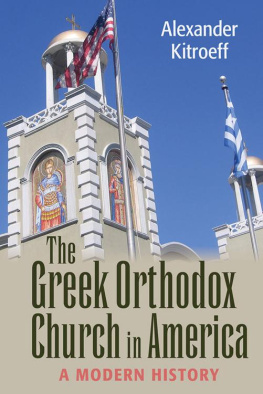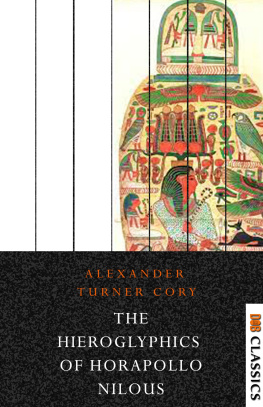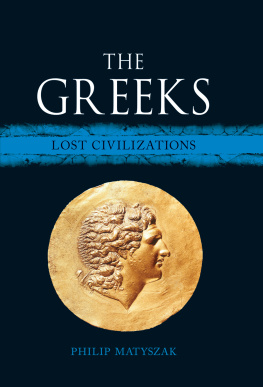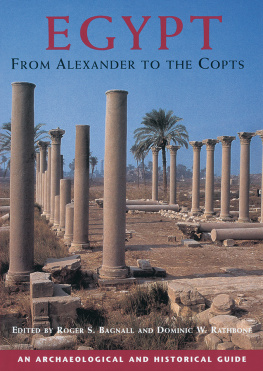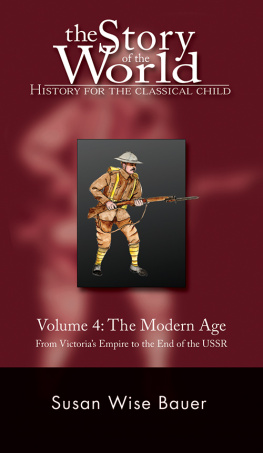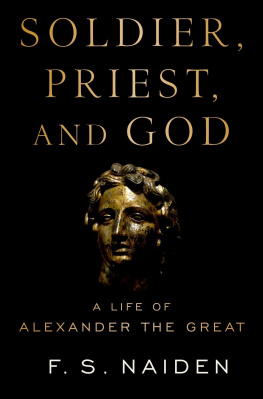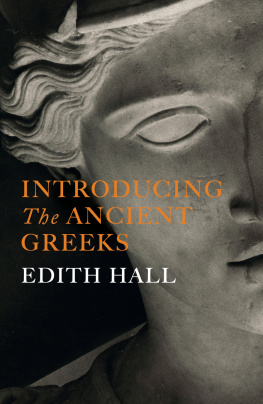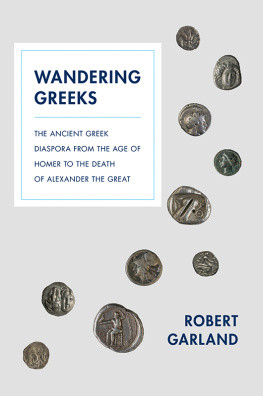This electronic edition published in 2018 by
The American University in Cairo Press
113 Sharia Kasr el Aini, Cairo, Egypt
420 Fifth Avenue, New York, NY 10018
www.aucpress.com
Copyright 2018 by Alexander Kitroeff
All rights reserved. No part of this publication may be reproduced, stored in a retrieval system, or transmitted in any form or by any means, electronic, mechanical, photocopying, recording, or otherwise, without the prior written permission of the publisher.
ISBN 978 977 416 858 1
eISBN 978 161 797 906 4
Version 1
Introduction
T here are presently about three thousand Greeks living in Egypt, most of them in Cairo, the rest in Alexandria. They are a pale reminder of a glorious past . In the period between the two world wars, a century after they began arriving, the Greeks in Egypt were about one hundred thousand. They were the largest and most diverse of the foreign communities in Egypt and played a prominent role in the countrys banking, cotton, and commercial sectors . This book tells the story of how the Greeks first settled in Egypt in the early nineteenth century, how their numbers and influence steadily grew, how a slow decline set in as Egypt began eliminating the privileges that benefited the Greeks and other foreigners, and concludes with the nationalization of most of Egypts economy in the 1960s, prompting an exodus that left only a few thousand Greeks who chose to remain. The book concludes with a discussion of the affection for Egypt and their past lives there that most of those who left still feel.
My connection with the history of the Greeks in Egypt is both personal and academic. My great-grandfather Alexander Theodore Kitroeff was one of the many Greeks who left their islands in the Aegean , in his case Chios, and settled in Alexandria in the late nineteenth century. He is buried there, next to his wife Polyxeni, in the Greek Orthodox Cemetery. Both my paternal grandparents were born in Alexandria in the early twentieth century , and my father was also born there. He left Egypt after the Second World War and eventually settled in Athens , where he married my mother. My grandmother also left Egypt around the same time, with her second husband, a Greek naval officer who was stationed in Egypt during the war . My grandfather stayed on until he had to reluctantly leave Egypt and go to Athens after the company he worked for, the Associated Cotton Ginners, was nationalized in 1961.
By that time most of my fathers relatives had moved from Egypt to Greece, and I grew up hearing stories about life in Egypt: the size of my great-grandfather s house in Ramla, how he forced my grandfather to go into the cotton business and limit his interest in classical music to playing chamber music in his free time , his brothers love of clay pigeon shooting and shooting real pigeons in the Nile Delta, my grandmothers experiences at the French lyce before she eloped with my grandfather , and my fathers pre-Second World War childhood, which involved the freedom of swimming in the harbor of Alexandria to enduring the disciplined routines of the British Boys School and Victoria College. All those stories were told in English or in Greek interspersed with generous helpings of Arabic, French , and a few Italian words.
My first academic encounter with the study of the Greeks of Egypt was in writing my masters thesis at Keele University. I chose to write about the Greek microcosm created in British-controlled Egypt during the Second World Warthe Greek government-in-exile that was based in Cairo, the military units that managed to escape before the Axis occupied Greece, and the Greek residents in Egypt. This topic reflected the great interest in the Greek 1940s that shaped Greek historiography in the late 1970s. My supervisor was Professor Paul Rolo, who was a descendant of one of Alexandrias most influential Anglo-Jewish families, and through his guidance I became familiar with the wider context of the events I was studying, including the lives of Greek and European communities in Egypt. Moreover, during my research I received a great deal of help and advice from the author Stratis Tsirkas (the nom de plume of Giannis Hadjiandreas), who spent most of his life in Egypt as a left-wing activist and writer. His two most important and influential studies were one which placed the poet Constantine Cavafy in Egypts sociohistorical context and the other was a three-part novel about the left-wing uprising in wartime Egypt, written in a style that echoed but also challenged Lawrence Durrells own literary evocation of wartime Alexandria.
It should therefore come as no surprise that I chose to study the Greeks of Egypt when at St. Antonys College at Oxford University it came time to pick a subject for my doctoral dissertation, which appeared in book form in 1989. At the time, the study of Greek diaspora communities was a major concern for many historians of Greece. The thinking in the late 1970s was that the relative weakness of the bourgeoisie within Greece , coupled with a wealthier diaspora bourgeoisie that played a middleman or comprador role, contributed to Greeces allegedly distorted capitalist development. This entailed focusing on the Greek merchant communities abroad , primarily in terms of their relationship to the Greek homeland . In deciding to examine the Greeks in Egypt it made sense for me to break with that approach and place the Greeks in their Egyptian context during the period immediately preceding the Second World War, a time that witnessed the rise of the Egyptian nationalist movement. Thus, I treated the Greeks both as a cohesive ethnic group with ties to Greece but also as an entity divided along class lines depending on their social position in Egypt, thus generating different responses to the rise of Egyptian nationalism. This approach was encouraged and immeasurably enriched thanks to the guidance of three leading scholars of the Middle East: my thesis supervisor Roger Owen, my second reader Albert Hourani, and the Alexandria-born economist Robert Mabroall fellows at St. Antonys Middle East Centre.
When I started writing this book I thought that producing a concise history of the Greek presence in modern Egypt would be relatively easy. A few years ago I had the opportunity to revisit the subject of the Greek role in Egypt when the Cultural Foundation of the Piraeus Bank Group in Greece asked me to edit contributions by an international team of scholars on aspects of the history of the cotton sector in Egypt. These were destined to form the academic blueprint of a cotton museum the Group planned to establish in Egypt, along the lines of several technological museums the Group set up in several areas in Greece. Unfortunately the outbreak of the Greek economic crisis forced the Group to shelve the plan for a cotton museum in Egypt, but hopefully such an undertaking might materialize in the future. At any rate, I believed that my task would be a smooth one in distilling the knowledge I gained working toward my masters thesis and my doctoral dissertation, reworking part of my book to relieve the cumbersome theoretical apparatus, deploying what I had learned doing the cotton museum project, and taking into account the substantial number of excellent studies on foreigners and Greeks in Egypt. Presenting an overview of a historical trajectory that spanned over a century and a half is not easy for any subject . In practice, the job of presenting the Greek role in Egyptfrom the era of Muhammad Ali to the nationalizations of private industry that took place under President Gamal Abd al-Nasseris challenging. The Greeks did not have merely a superficial, colonial-type of presence in the country but instead penetrated deep into its fabric, its economy, and its cities and provincial towns. They developed a complex network of ethnic institutions that fostered their identity, strengthened their ties to each other, and formed a strong bond to their homeland . Finally, the Greeks in Egypt saw themselves as having a special relationship with Egypt and the Egyptians. This sense was built by invoking the relations between the ancient Egyptian and Greek civilizations, and in the modern era, the idea that Greeks were contributing to Egypts development more as partners rather than foreign residents.





